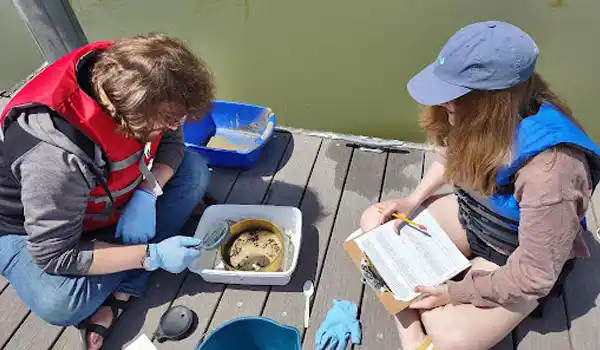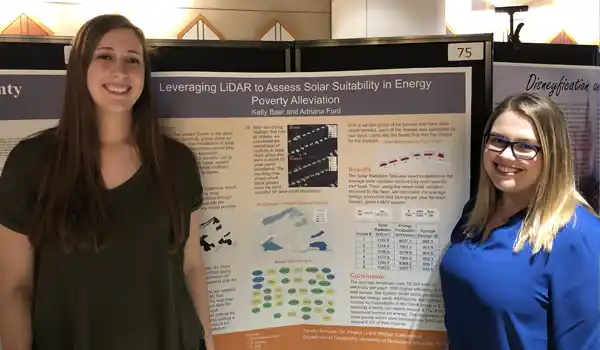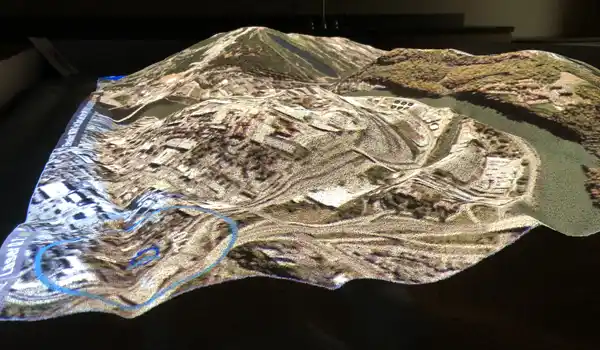
Geography Major, BA – Climate & Climate Change Concentration
The Climate and Climate Change Concentration provides students with the knowledge necessary to understand past, present, and future global climate patterns and trends. Courses focus on understanding the foundations of global climate patterns, how climate has changed through time, and how climate change has affected people, plants, and animals, the landscape, and natural hazards. Students in this concentration will gain skills in assessing past climate change through proxy records, understanding current weather and climate patterns, and evaluating when and how much climate can be expected to change in the near and far future.

Geography Major, BA – Landscapes & Environmental Change Concentration
The Landscapes and Environmental Change concentration focuses on understanding how landscape and environmental changes, hazards, and disasters have altered the earth’s surface and impacted human populations and societies. Some key questions addressed in the courses in this concentration concern the role humans have played in facilitating landscape and environmental changes. The students completing this concentration will be poised for careers in academia and jobs associated with environmental management and consulting, landscape design and planning, ecological and hazards risk assessment, water resources management, and others.

Geography Major, BA – Geospatial Science and Technology Concentration
The Geospatial Science and Technology concentration provides a practical understanding of GIS technology and its application in various fields, such as natural resource management, marketing, disaster response, social welfare, etc. Students explore a range of GIS topics and gain hands-on experience in this concentration. The Geospatial Science and Technology concentration will help Geography majors pursue jobs in many different career paths that require more technical expertise.

Geographic Information Science and Technology, BS
The GIST major explores a wide range of sub-disciplines including transportation logistics, remote sensing (including satellites and drones) emergency management, urban planning, public health, and resource and environmental management, among others. The GIST program will teach students to use spatial mapping, modeling, and analytics to make informed decisions. Foundational training in spatial, statistical, and mathematical analysis, as well as computer science, spatial data structures, algorithms, and information visualization will occur. The technical skills needed to retrieve and cleanse big spatial data for real-world applications will also be taught. Additionally, students learn the skills to prepare and display data to model, analyze, and evaluate issues at hand.

Geography Major, BA – Space, Society, and Culture Concentration
Courses in the Space, Society and Culture concentration study how people, groups and communities create distinctive landscapes, how they claim, occupy, and even struggle over places, and how they identify with places and animate our surroundings with meaning. Students learn to critically examine their own culture and others’ ways of life, thereby gaining a greater understanding of themselves and the world at large. Skills developed in this concentration can be applied to employment in education, government and international organizations, urban planning, non-profit organizations, travel and tourism, businesses, international trade, and other fields.

Geography Major, BA – Urban Studies Concentration
Students will learn about the major topics, issues, and problems currently confronting cities in different parts of the world. They will be asked to analyze and study these topics and issues and to think about their different effects on local and global communities. Students will also be able to draw from their major to apply their knowledge and experience to urban issues and topics. They will be expected to analyze information, apply it to different urban contexts and to critically think about possible solutions, other approaches and/or alternative frameworks or theories.

Sustainability Major, BA
The sustainability program engages students in a systems approach to solving pressing issues at the intersection of society, economics, and the environment. Topics studied include climate change, land-use change and biodiversity, water resources, natural resource management, and sustainable development at the local and global scales. Students develop a foundational knowledge of natural and social science with a skill set in geographic information systems, data analysis, communication, policy, and development. Experiential learning is a core to the sustainability major. Students take service-learning and field methods courses as part of the curriculum and are encouraged to engage in sustainability initiatives on campus and in the surrounding community.

Sustainability Major, BA – Public Policy Concentration
Students pursuing the public policy concentration will study 4 lower-division and 12 upper-division courses in public policy in partnership with the Baker School for Public Policy and Public Affairs. The concentration will provide students the opportunity to learn how laws, guidelines, and actions are decided and taken by governments in order to work in favor of the public. Public policy guides which laws are passed, where funding goes, and which topics concern issues important to sustainability. Students will learn the foundation of public policy in the context of the broader sustainability degree.

Sustainability Major, BA – Supply Chain Management Concentration
The concentration in Supply Chain Management allows students to study at the intersection of commerce and environmental responsibility. The concentration is a collaboration between the Departments of Geography & Sustainability, Agriculture and Natural Resource Economics, and Supply Chain Management. Sustainability, BA students will have 11 credit hours with a concentration in Supply Chain Management. Three of those credit hours include a capstone course focusing on applying Sustainable Supply Chain Management methodologies. Students will equip themselves with the skills to innovate sustainable practices from procurement to distribution. Students will learn strategies for reducing carbon footprints, enhancing ethical sourcing, and optimizing resource efficiency.
